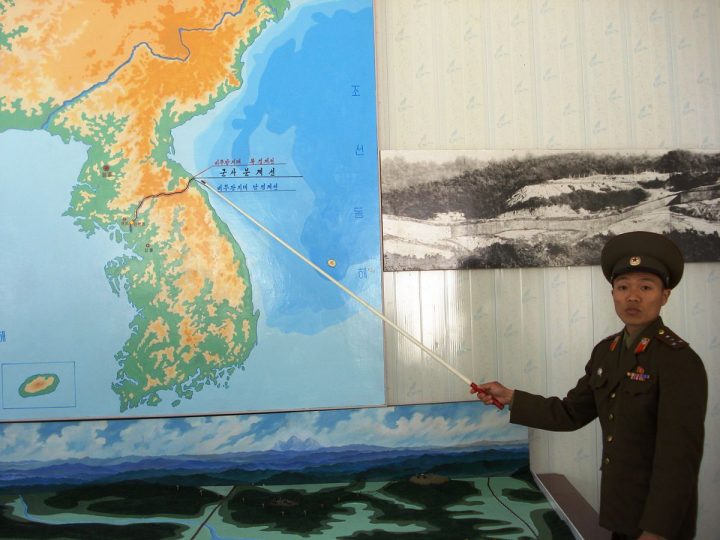Paul Rogers 4 May 2017 for openDemocracy
Washington and London’s joint military exercises with Seoul raise questions that should be asked in Britain’s election campaign.
An attack on a Nato convoy in Kabul on 3 May killed eight civilians and injured at least twenty-five people, including three Americans. It is a sign of escalating war that coincides with the annual “fighting season” in Afghanistan. The fear in Washington is of a tipping-point: that the Taliban, which now controls as much as a third of the country, may be close to destabilising the government.
Washington’s immediate reaction was to send some of its top military leaders to Kabul. There was also talk of 3,000-5,000 more United States troops being sent to try and support the Afghan national army (ANA). If the plan is implemented, as seems highly likely, then Nato as a whole will be expected to make an additional contribution. That raises the prospect of British combat-troops being redeployed to Helmand province, the scene of bitter fighting after 2006, when many hundreds of young soldiers were killed or critically injuted after a previous troop surge.
In turn this possibility focuses attention on Britain’s relationship with President Trump. If Theresa May’s Conservative government is re-elected on 8 June, it might well wish to demonstrate the prime minister’s much-vaunted “strong and stable” doctrine alongside its closest ally. Military defence and security is a key part of the Conservative approach to the election. But the return of substantial numbers of western troops to Afghanistan into the sixteenth year of the war would suggest that the Labour leader Jeremy Corbyn’s desire for a full review of defence policy would make much more sense.
North Korea does at last appear to be making progress towards developing nuclear warheads and long-range delivery-systems.
Conservatives’ claims on defence can be tricky to question, given the efforts the party puts into maintaining “ownership” of the issue. But one new factor may complicate matters: the attitude and behaviour of Trump towards North Korea.
The basic problem for the United States is that North Korea does at last appear to be making progress towards developing nuclear warheads and long-range delivery-systems. Some recent reports from US intelligence sources suggest that the regime could have up to forty nuclear warheads and some intercontinental-range missiles by the end of Trump’s first term.
Even if North Korea sees these weapons purely as a deterrent against attack, Washington’s perspective is that such a situation is wholly uncceptable and must be prevented at all costs. If military action against Pyongyang becomes a real threat, then Trump’s White House will look for allies in order to provide a semblance of international approval. Trump’s unpredictability and potential hawkishness on the issue has already caused angst in Australia, the US’s closest regional ally. In recent years, increasing military cooperation includes a US marine corps base near Darwin. It is likely that Britain too will be expected to give support.
The next theatre
In normal circumstances this seems far-fetched. Is there any real chance that British military units could end up fighting in North Korea, something that has not happened since the Korean war ended, after a long stalemate, in 1953?
This is where another factor enters. In recent months the UK has developed a sudden and unexpectedly close relationship in the shape of joint operations involving the Royal Air Force (RAF), the US air force (USAF), and the Republic of Korea Air Force (ROKAF). The details were published at the time, but their significance did not really emerge until after Trump had taken office: by an odd twist, the main operations coincided with his election in November.
Then, as part of exercise Invincible Shield, around 200 RAF personnel were sent to Osan air base in South Korea for the first ever joint exercise with ROKAF (and the first Korean-based joint air operation of its kind to involve a foreign power other than the United States). They were accompanied by four Eurofighter Typhoon aircraft of RAF No. 2 Squadron, as well as a Voyager tanker aircraft and a C-17 transport aircraft. The six-day deployment was with ROKAF’s F-15K and the US air force’s F-16 aircraft.
In recent months the UK has developed a sudden and unexpectedly close relationship in the shape of joint operations involving the Royal Air Force, the US air force, and the Republic of Korea Air Force.
The head of ROKAF’s air-operations command, General Won In-Choul, said that the exercise would both enhance the capability “to protect peace and stability of the Korean peninsula” and “greatly contribute to the improvement of military cooperation with the Royal Air Force”.
Meanwhile in offshore western Europe, a long way from east Asia, it is certain that the Conservatives will continue to accentuate their position as “the” party of defence in the UK’s general-election campaign. If so, questions might be asked of both regional and global significance:
Will the UK respond positively to a request from President Trump for military assistance against North Korea? If not, why has the RAF been gaining the experience to work with Seoul and Washington in those exercises in South Korea?
After fifteen years of war, three wrecked countries, hundreds of thousands of civilians killed, and no end in sight, is the current approach even remotely sensible? If not, why continue with it?
Paul Rogers is professor in the department of peace studies at Bradford University, northern England. He is openDemocracy’s international security adviser, and has been writing a weekly column on global security since 28 September 2001; he also writes a monthly briefing for the Oxford Research Group. His latest book is Irregular War: ISIS and the New Threat from the Margins (IB Tauris, 2016), which follows Why We’re Losing the War on Terror (Polity, 2007), and Losing Control: Global Security in the 21st Century (Pluto Press, 3rd edition, 2010). He is on Twitter at: @ProfPRogers










